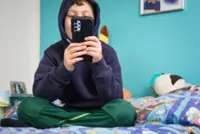OKAY, so that’s a very big claim. It sounds like some crack trying to sell shortcuts to hapless parents. But I bet all you hapless parents (me included) are a little intrigued. Do you dare read on? What harm can another parenting article do, right? It’s just words. So I’m going to present you with a few revelations.
Here’s the first one. Do you know that you go in and out of hypnosis several times a day? When you close your eyes and daydream, you’re hypnotised. When you’re driving and you go on auto-pilot from point A to point B, you’re hypnotised. When you wake up or go to sleep and you’re in that halfway stage, you’re hypnotised.
If you’re still with me, be prepared to turn any preconceived notion you have about hypnosis on its head.
The second revelation is that children also go in and out of hypnosis all the time, easier and more often than you and me.
The third revelation is that hypnosis is a natural state and anyone can use it in its simple form.
The fourth and most important revelation is that you are a natural hypnotist, especially with your kids.
Hypnosis and children
Basic parenting skills in an ideal context is about providing a completely safe environment for the child, having no judgments or expectations of the child and absolutely believing in them.
But we’re not living in utopia.
As parents, we’re faced with day-to-day stress, socio-economic pressures and the demands of one or more children. That’s when conflict takes place.
Sheila Menon, a Selangor-based behavioural psychologist and hypnotherapist who heads the London College of Clinical Hypnosis (LCCH) Malaysia, believes hypnotism is something that parents can use naturally with their children. One key aspect of it is engaging the imagination.
If young children are asked to analyse and deduce, it’ll be very difficult for them to understand what adults are talking about. A five-year-old’s critical faculties are about 30% developed. At 15, it’s about 60%. At 25, it is fully developed.
But children can imagine anything. In fact, it is easier for kids to imagine than to be logical. When an adult speaks to them and get into their fancy and dreams, you give them something to focus on, as opposed to having them do some kind of analysis to get to where they want to go.
“By using their imagination, you’re helping a child to focus on the goal where he or she wants to go. You empower them by keeping the language positive, not in terms of everything being nice and rosy, but by talking about things that are there. Maybe they’re still sucking their thumbs, but they’ve learned to walk. There’s always something that they have achieved that you can use to empower,” says Menon.
“If you empower children, who are set up to learn anyway, you give them an easy method to learn something that’s going to help them solve their problems.”
Menon, who has worked with children throughout her career and has been with LCCH in Britain since 1990 (the Malaysian branch was set up in 2006).
Parenting the younger child
When you have a young child, you start with a clean slate. He or she knows nothing about the world and is therefore completely dependent on you. You are more autocratic in their life, because they haven’t started to recognise that their peers also have an opinion.
So how do you use hypnotism, or dare we say the words: How do you hypnotise a child?
There is no magic trick or swinging of a pocket watch in front of your child’s eyes. You don’t “instruct” him or her to do things or to become a model child.
All you do is get to know how your child’s mind works, change how you perceive him or her and change how you talk. Tap into their imagination. Guide them to a positive way of thinking.
The American Paediatric Association uses visualisation techniques, relaxation and storytelling in child hypnosis.
“But they don’t use them in full – they use a little here and there. And that’s really what’s appropriate for children. For adults, we ask them to close their eyes, because 40% of the brain is used up in assessing what’s out there. So adults need to switch that off and focus on the inside. Children, if you ask them to imagine themselves as a dancer, or going to the zoo, they can do it without closing their eyes,” says Menon.
At this stage in their life, you utilise three areas – imagination, positive regard, and simple positive language.
“The first thing parents should do is change their language,” says Menon. “Talk in the positive. Focus on experiences that the child has done successfully.”
She gives the example of bedwetting. When children start wetting the bed, a few things kick in. Parents’ sleep gets disrupted. They blame themselves and are frustrated when the child doesn’t stop. The whole conversation revolves around wet beds.
“The image triggered for the child is wet bed. Even when they’re trying not to, they’re picturing the wet bed. So the message they give their bodies is wet bed. Our bodies behave the same – 10% of it is logical and deductive, 90% of it is imagination. The 10% is getting the ‘don’t’, and the rest of the imagination is getting ‘wet bed’!” says Menon.
“So we talk about dry bed,” she continues. “It’s really that simple!”
The same example can be applied to things like scoring high marks for an exam, nail-biting and more.
“In nail-biting, we talk about young men having good groomed nails, or heroes having good strong nails. Or girls showing off their fingers. It’s something a child can identify with and buy into, which has a personal investment for them as opposed to just the parent saying,” says Menon.
She says until 15 years of age, children can change quickly. Parents just need to give them something absolute to visualise, and they can get there and get there fast. She also points out that when your child gets a little older, and you keep working with the hypnosis, which is basically using imagination, visualisation and relaxation, you’ll find that beta waves that are associated with concentration and learning will increase.
Parenting a teenager
As children get older, they are socialised away from the change process. They have more and more vested interests in hanging on to a position.
“What tends to happen is if a child has a position, they would have invested a bit of their identity into it. If you now come and challenge them, a whole bunch of stuff kicks in. They then hold on to that position rather than look at the options. Hence teenage angst or rebellion,” explains Menon.
She says parenting a teenager, though requiring a different skill set, still goes back to the same areas – imagination and positive regard. Teens start to think what their peers are saying is more important than what parents are saying.
“They are experimenting their individuation, and we as parents don’t recognise that. Or we have the view of where they should go and we want them to get there straightaway. However, they have to meander in their own way to get there. Part of parenting is the pain of letting go as much as the joy of supporting them,” says Menon.
“Children have to become the future adults, so they’re going to reject something their parents say anyway. We all do it and our children will do it to us, so we might as well work with the process as opposed to conflict with it,” she adds.
In the same way you deal with a younger child, so you will with a teenager. Use positive language and imagination, and always turn back to things they’ve been successful with.
Menon also urges parents to be honest. “Parents sometimes feel they should sanitise or dress up the truth. But children are pretty skilful at knowing when something is being dressed up. They may not know what we’re dressing up, and they’ll generally get it wrong, which is not helpful. If we’re honest, they can believe in the intention and it cuts through conflict situations. (Being honest) is also useful with young children who are a little more intuitive, more intelligent and smarter.
No matter how flawed we are, we have our kids’ best interests at heart. If we can actually show that, through body language, that’s something children can identify with. It then becomes congruent with whatever it is you’re suggesting to them.
Training their minds
There is one more revelation that was omitted from the beginning. When you use hypnosis with your kids, you are training their mind to always focus on the positive. Think of how top sports personalities visualise a successful outcome.
Think of the Olympic runner who stares into the mirror right before a race, and tells herself that that gold medal is hers, and continues to picture herself on the winner’s podium, wearing the medal.
Parents are the greatest natural hypnotists. They use funny voices, they tell stories, they engage the imagination. These are techniques that parents instinctively know, yet they don’t realise what an amazing skill they have.
For more information, go to www.hypnosis-malaysia.com or call (03) 7960-6439.





